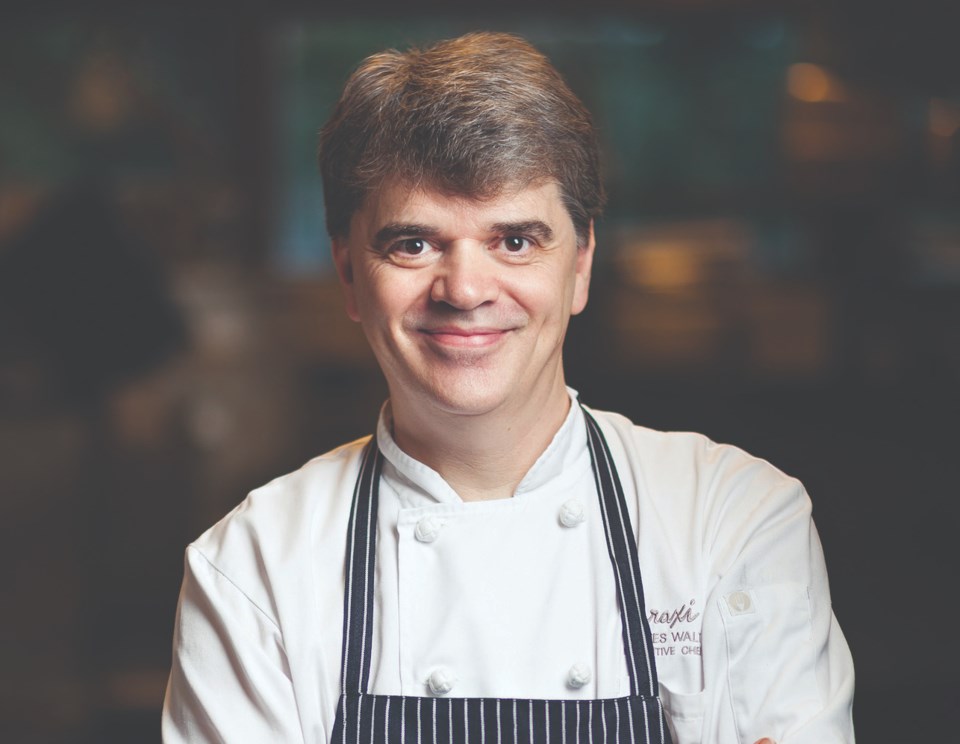For so many Whistlerites, Araxi Restaurant is a constant. Whether celebrating a birthday, an anniversary, or taking advantage of its annual anniversary prix fixe menu, you can always count on Araxi to serve up a special culinary experience.
But for the people behind the scenes at the resort’s first fine dining restaurant, if there has been one constant over the past 40 years, it’s change.
“I think the biggest thing was never sitting on our laurels. Even when things were good, there was always an eye on the big picture, on forecasting,” said James Walt, culinary director for Toptable Group. “It was never about just sitting here in Whistler; we were always reaching.”
Araxi marked its 40th anniversary this week, four decades after the restaurant opened its doors in the nascent village on Halloween night, 1981. To get a sense of the continued evolution of one of Canada’s most highly regarded restaurants, you of course have to understand the unrelenting drive of its founder, Jack Evrensel.
Charmed by the crepe shops he found in ski resorts in his native Quebec, engineering student Evrensel and his wife Araxi made the cross-country trek to Whistler in 1980 with dreams of opening a quaint eatery in the sleepy ski town.
“The idea was to open a restaurant in a ski resort with another couple and ski all day—and how much work can it be having fun with people at night? And then we would lock the doors and go fishing in the summer. That was the plan,” Evrensel told Pique in a 2011 interview.
As fate would have it, that’s not quite how things panned out. Once settled in the resort, Evrensel began to make trips across the West Coast, and the restaurants he visited in L.A., San Francisco and Seattle instilled in him “an unwavering passion to do something special,” said Walt.
One of the restaurant’s first outside hires when he took over as executive chef in 1997, Walt was privy to what would eventually become the restaurant’s single biggest transformation, from a traditional Italian restaurant replete with not one but two pizza ovens, into a regionally focused purveyor of farm-to-table cuisine well before the term had become a favourite buzzword of the restaurant world.
“We just leaned right into the B.C. element. We grew the B.C. wine list, the B.C. products, the style of cuisine, redid the room and then just basically reimagined the space,” recalled Walt. “When we first did the 100 Mile menu, that’s all everyone was talking about. I remember saying to people it really wasn’t that challenging. In this part of the world, we have everything. If we were in Churchill, Manitoba or something, it would have been a feat. We were talking the talk and walking the walk.”
If Walt was looking for affirmation of the new direction, he didn’t have to wait long. In 1998, he was invited to cook at the prestigious James Beard House in New York City, and Walt and his team doubled down on the local approach.
“I took six coolers of products. We went all in, B.C. wines, everything. We were relentless with this Canadian product,” Walt said. “It was amazing. The people were thrilled; standing ovation. I felt incredible. I think it kind of validated what we were trying to do.”
Another watershed moment for Araxi came ahead of the 2010 Olympics, when the restaurant was featured in Season 6 of the Gordon Ramsay-helmed reality cooking competition, Hell’s Kitchen, which also helped catapult Araxi’s first cookbook into selling more than 20,000 copies.
“You can’t deny the Hell’s Kitchen thing,” Walt says. “I don’t want to say we were ignorant, but I don’t think Jack and I realized the reach of that.”
In 2014, Vancouver's Aquilini family purchased Araxi from Evrensel, and in the subsequent years, Toptable has expanded its presence in Whistler with the opening of tapas spot, Bar Oso, the acquisition of Umberto Menghi’s elegant Italian restaurant, Il Caminetto, and, most recently, announced plans for a new space, tentatively called Provisions, next to Araxi.
Walt believes it speaks to the trend first established by the restless Evrensel, allowing the countless cooks, servers, hosts, bartenders and sommeliers that have passed through Araxi’s doors the opportunity to progress in an industry not known for its career prospects.
“For myself, I’m getting older, so it’s more about the people around me. If people feel like they’re learning something or they’re a part of something bigger than themselves, that’s what we want,” he said. “We realize it’s just a restaurant, but to us it isn’t just a restaurant, it’s almost a way of life.”




